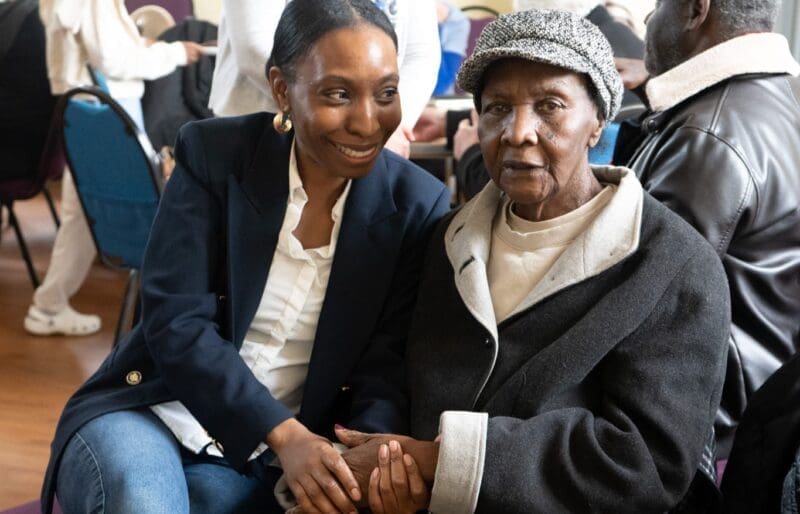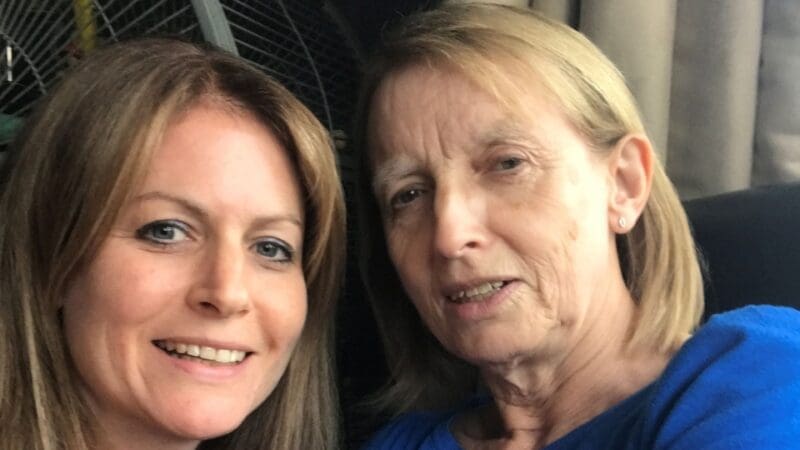
“I couldn’t find a dementia community, so I created one”
When Michaela’s grandmother, Vanda, was diagnosed with vascular dementia, she dedicated herself to creating a place where dementia wasn’t a taboo subject.
Dementia is a progressive, life-limiting condition with no cure, so everyone with dementia will die with or from it. Good end of life care is essential to make sure the person with dementia and their family are well supported. Our dementia specialist Admiral Nurses share their advice on recognising this stage and how you can find support.
Amongst professionals, it is usually understood that a person is approaching the end of life when it is thought that they are within the last weeks, months or even years of life. However, this is very individual and often difficult to predict, so it is better to focus on their needs rather than on how long they have left to live.
Signs that a person with dementia might be approaching the end of life include:
However, these may also be signs of another condition that could be treated, like pain or delirium. If you are unsure, it is worth consulting the person’s GP.
Whether a person has dementia alone or other health conditions alongside, it is essential that they receive supportive, respectful end of life care. This often involves a shift away from treatments that may cause distress or have limited benefit, focusing instead on comfort.
Making clear plans about how the person with dementia will be cared for will help everyone support them in the best way possible and give family and friends peace of mind. If possible, the person themselves should be involved in these decisions.
These plans could include:
You might want to ask the GP or a dementia specialist Admiral Nurse for advice on putting together an advance care plan or ADRT.
If the person with dementia has not previously made their wishes known and now lacks the mental capacity to do so, other people may need to make decisions on their behalf, in their best interests.
Deciding that someone should not be resuscitated if their heart stops can be extremely difficult. But resuscitation is often unsuccessful for a person with advanced dementia and could cause distress and trauma.
For this reason, in consultation with the person with dementia (if possible) and their family, a health professional may suggest putting a ‘Do not attempt CPR’ (DNACPR) order in place. The NHS has more information that may be helpful.
At the end of life, people may have a reduced appetite or not want to eat or drink at all. This can be hard to accept, but it is a natural part of the dying process.
Invasive interventions like tube or drip feeding are unlikely to extend the person’s life and may cause distress. Instead, their care team might suggest focusing on giving food and drink for comfort and enjoyment, rather than nutrition.
For example, you could:
Frequent infections are common towards the end of life, especially chest infections, pneumonia and urinary tract infections (UTIs).
It is important to consult the person’s GP if they are showing signs of infection. If they can still swallow, they may be prescribed antibiotics to be taken by mouth which could help to relieve their symptoms. However, the GP may feel that antibiotics are not appropriate – for example, if the person has swallowing difficulties and antibiotics would have to be administered by drip – and prescribe other types of medication to keep them as comfortable and peaceful as possible.
In the later stages of dementia, many people become increasingly frail and experience mobility problems and falls.
You and the person’s care team may want to discuss whether it is right for them to go to hospital if they fall. For example, if they have a suspected fracture or other serious injury, they will need to be assessed in hospital. Otherwise, it may be possible to support them to stay at home or in their care home.
Becoming frail and less mobile may lead to other health problems – for instance, if the person spends long periods in a chair or bed, they may develop constipation and pressure sores. Their GP may refer them to a district nurse for treatment and advice.
It is important to think about where the person with dementia will be cared for at the end of life. People with advanced dementia often need 24-hour care, so you may want to consider support from paid home carers or a move into residential care. This can be a very difficult decision but if the person has professional support, you can focus on spending time together while being confident their care needs are met.
Social services can arrange a needs assessment for the person with dementia and a carer’s assessment for you to establish what support would be beneficial.
Some people with dementia are admitted to hospital towards the end of life, and some will die there. While this may not be what you or the person wanted, you can still be involved in their care, so speak to staff about their needs and preferences and how you can support them.
There may be a local hospice that can support you and the person you care for – for example by helping with symptom management to keep them as comfortable as possible, whether that is at home or in the hospice itself. Your GP can advise about local hospices and palliative care provision.
Keep in mind that decisions about the person’s care may need to be revisited if their needs change.
Although the person with dementia may not be able to express their feelings, it is important that they feel loved, safe and secure. You could try:
It is important that any religious, spiritual or cultural beliefs and values are respected at the end of life. For example:
You could include this information in their care plan or life story.
Most of the advice around end of life care with dementia also applies to young onset dementia (where symptoms develop before the age of 65). Important issues like advance care planning and resuscitation should still be considered, even though the person may be in better physical health than an older person.
However, you are likely to face additional issues relating to their life stage, like:
If you work, it is a good idea to tell your employer about your situation so you can access carer’s leave. Many employers continue to pay the employee while they are taking carer’s leave, although they do not have to. They may also offer bereavement support.
A child or young person facing the death of a parent or other family member is likely to need a lot of support. Conversations about the end of life can be very difficult, but speaking honestly can help them feel supported and secure.
These tips may help:
When someone close to you is at the end of life, it is vital that you feel well supported. You may wish to seek help from:
You can also contact our free Helpline to speak to a dementia specialist Admiral Nurse: please call 0800 888 6678 (Monday-Friday 9am-9pm, Saturday and Sunday 9am-5pm, every day except 25th December), or email helpline@dementiauk.org
If you prefer, you can book a phone or video appointment with an Admiral Nurse in our virtual clinic.
Dementia UK resources
Good hydration for a person with dementia
Looking after yourself as a carer
Mental capacity and decision-making
Supporting children and adolescents with a parent with young onset dementia
Supporting children and adolescents with grief, bereavement and loss
Young onset dementia: choosing a care home
Other resources
Carer’s assessment – find your local social services
Compassion in Dying: living Will advice
Marie Curie: care and support through terminal illness
Resuscitation Council UK ReSPECT plan for emergency care and CPR
Thanks for downloading! We’re only asking for your email so we can measure downloads and ask for your feedback. We won’t sign you up for any marketing communications, but if you'd like to stay in touch, sign up for our newsletter by clicking "Subscribe to our newsletter" at the bottom of this page.
Our virtual clinics give you the chance to discuss any questions or concerns with a dementia specialist Admiral Nurse by phone or video call, at a time that suits you.

When Michaela’s grandmother, Vanda, was diagnosed with vascular dementia, she dedicated herself to creating a place where dementia wasn’t a taboo subject.

As a palliative care nurse, Jenny reflects on the importance of empathy during end of life care and how her Admiral Nurse helped her family prepare for her Mum's death.

When Rosie’s mum, Dawnie, was diagnosed with young onset Alzheimer’s disease, her employer ensured caring responsibilities were fully supported.